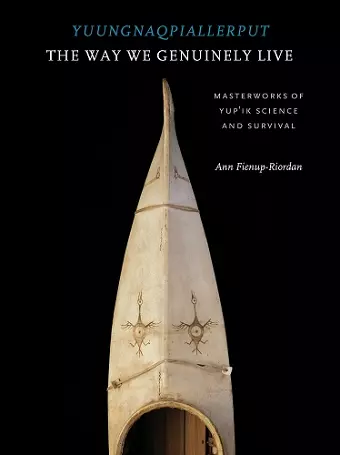Yuungnaqpiallerput / the Way We Genuinely Live
Masterworks of Yup'ik Science and Survival
Format:Paperback
Publisher:University of Washington Press
Published:3rd Aug '07
Should be back in stock very soon

Survival in the harsh sub-arctic environment requires resourcefulness and ingenuity. This book explores the manifestations of Yup'ik technology by following the seasonal cycle of harvests and ceremonial renewals.
Honorable mention for the Victor Turner Award for Ethnographic Writing from the Society for Humanistic Anthropology
Honorable mention for the 2008 William Mills Prize for Non-Fiction Polar Books
Survival in the harsh subarctic environment requires great resourcefulness and ingenuity. The Yup'ik people of southwest Alaska meet the challenge by using traditional technology and by following a philosophy that recognizes the personhood of all living things and the environment. Their use of nature's resources is a testament to the mutual respect and generosity that exists between humans and the animals, plants, land, and sea that sustain them.
Wastefulness being disrespectful, Yup'ik elders made use of every last scrap from hunts and harvests: seal guts became warm, waterproof, and breathable parkas; the skins of fish were fashioned into waterproof mittens, while their heads and entrails were stored in naturally refrigerated pits as insurance against future famine. Dried grasses became anything from insulating socks to bedding to sled rope, or even goggles to protect against snow blindness; rancid seal oil mixed with tundra moss became "Yup'ik epoxy" for caulking and gluing; and driving snow was manipulated to provide a defense against its own dangers. Although tools have changed, Yup'ik people today continue to engage in many traditional harvesting activities, using these new means to accomplish distinctly Yup'ik ends.
In Yuungnaqpiallerput / The Way We Genuinely Live, Yup'ik elders examine tools and daily-use items, explaining how they were made and for what purpose. Just as Western science relies on the testing of hypotheses, Yup'ik science developed its technologies through systematic trial and error, yielding ingenious and effective solutions to life's challenges. The elders also delve beyond the practical aspects of these artifacts to elucidate the ways in which their creation and use are part of Yup'ik cosmology and traditional spiritual values. Every item carries special significance, and the actions associated with each should be undertaken with awareness and deliberation, for nothing goes unnoticed by the consciousness of the surrounding universe. Ann Fienup-Riordan explores these manifestations of Yup'ik technology by following the seasonal cycle of harvests and ceremonial renewals,...
"…this book brilliantly accomplishes the mission of faithfully portraying the Yup'ik concept of science, or technology as a way of making prayer…. Fienup-Riordan's eloquent publication is a meaningful source for interpretation of material culture, whether for the study of contemporary groups or for the reconstruction of life ways and beliefs of past hunter-gatherers."
(Études/Inuit/Studies)"Every Native Studies scholar should read every work published by Ann Fienup-Riordan. She is the best contemporary Arctic ethnographer, and among the best anthropologists in the world. [This book] sets an excellent example for the rest of us working within the field of Native Studies."
(The Canadian Journal of Native Studies)"These two publications, Paitarkiutenka and Yuungnaqpiallerput, are fitting companions, bringing to life the deep and ancient connections between the Yupik people and their ancestral homeland."
(Pacific Northwest Quarterly)"This book belongs on a shelf with the classics of Alaskan anthropology. It will be an indispensable reference to all people interested in northern societies and material culture—- from future generations of Yup'ik harvesters and craftsmen, to museum curators and archaeologists who wish to better understand the remarkable objects in their care."
(Alaska HistISBN: 9780295986692
Dimensions: unknown
Weight: 1742g
376 pages